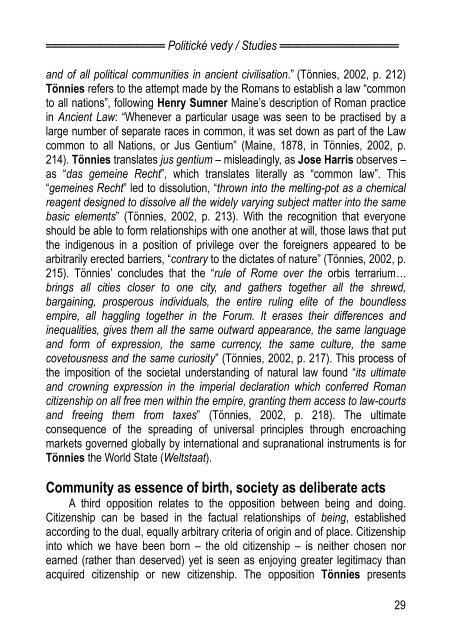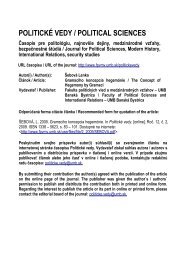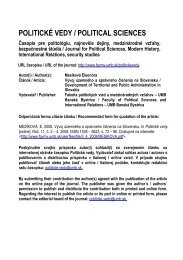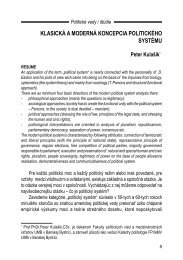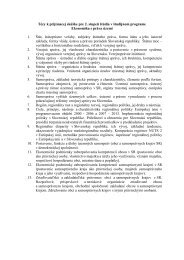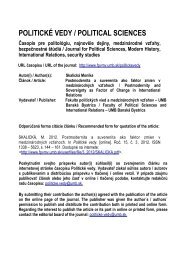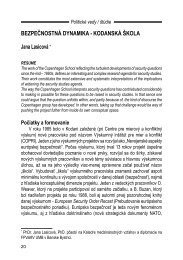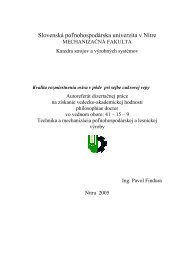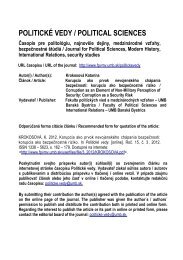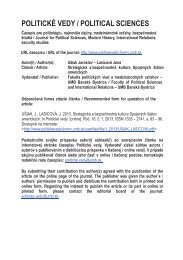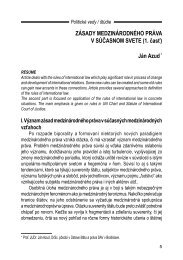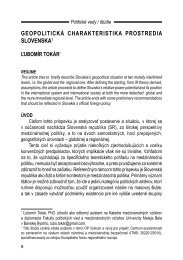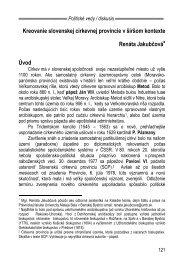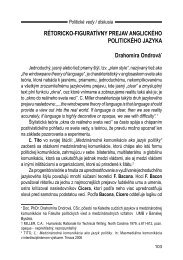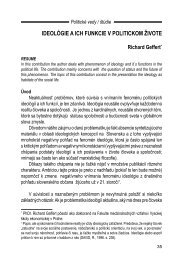Citizenship in Community and Society: Ferdinand ... - Politické vedy
Citizenship in Community and Society: Ferdinand ... - Politické vedy
Citizenship in Community and Society: Ferdinand ... - Politické vedy
You also want an ePaper? Increase the reach of your titles
YUMPU automatically turns print PDFs into web optimized ePapers that Google loves.
═════════════ Politické <strong>vedy</strong> / Studies ═════════════<br />
<strong>and</strong> of all political communities <strong>in</strong> ancient civilisation.” (Tönnies, 2002, p. 212)<br />
Tönnies refers to the attempt made by the Romans to establish a law “common<br />
to all nations”, follow<strong>in</strong>g Henry Sumner Ma<strong>in</strong>e’s description of Roman practice<br />
<strong>in</strong> Ancient Law: “Whenever a particular usage was seen to be practised by a<br />
large number of separate races <strong>in</strong> common, it was set down as part of the Law<br />
common to all Nations, or Jus Gentium” (Ma<strong>in</strong>e, 1878, <strong>in</strong> Tönnies, 2002, p.<br />
214). Tönnies translates jus gentium – mislead<strong>in</strong>gly, as Jose Harris observes –<br />
as “das geme<strong>in</strong>e Recht”, which translates literally as “common law”. This<br />
“geme<strong>in</strong>es Recht” led to dissolution, “thrown <strong>in</strong>to the melt<strong>in</strong>g-pot as a chemical<br />
reagent designed to dissolve all the widely vary<strong>in</strong>g subject matter <strong>in</strong>to the same<br />
basic elements” (Tönnies, 2002, p. 213). With the recognition that everyone<br />
should be able to form relationships with one another at will, those laws that put<br />
the <strong>in</strong>digenous <strong>in</strong> a position of privilege over the foreigners appeared to be<br />
arbitrarily erected barriers, “contrary to the dictates of nature” (Tönnies, 2002, p.<br />
215). Tönnies’ concludes that the “rule of Rome over the orbis terrarium…<br />
br<strong>in</strong>gs all cities closer to one city, <strong>and</strong> gathers together all the shrewd,<br />
barga<strong>in</strong><strong>in</strong>g, prosperous <strong>in</strong>dividuals, the entire rul<strong>in</strong>g elite of the boundless<br />
empire, all haggl<strong>in</strong>g together <strong>in</strong> the Forum. It erases their differences <strong>and</strong><br />
<strong>in</strong>equalities, gives them all the same outward appearance, the same language<br />
<strong>and</strong> form of expression, the same currency, the same culture, the same<br />
covetousness <strong>and</strong> the same curiosity” (Tönnies, 2002, p. 217). This process of<br />
the imposition of the societal underst<strong>and</strong><strong>in</strong>g of natural law found “its ultimate<br />
<strong>and</strong> crown<strong>in</strong>g expression <strong>in</strong> the imperial declaration which conferred Roman<br />
citizenship on all free men with<strong>in</strong> the empire, grant<strong>in</strong>g them access to law-courts<br />
<strong>and</strong> free<strong>in</strong>g them from taxes” (Tönnies, 2002, p. 218). The ultimate<br />
consequence of the spread<strong>in</strong>g of universal pr<strong>in</strong>ciples through encroach<strong>in</strong>g<br />
markets governed globally by <strong>in</strong>ternational <strong>and</strong> supranational <strong>in</strong>struments is for<br />
Tönnies the World State (Weltstaat).<br />
<strong>Community</strong> as essence of birth, society as deliberate acts<br />
A third opposition relates to the opposition between be<strong>in</strong>g <strong>and</strong> do<strong>in</strong>g.<br />
<strong>Citizenship</strong> can be based <strong>in</strong> the factual relationships of be<strong>in</strong>g, established<br />
accord<strong>in</strong>g to the dual, equally arbitrary criteria of orig<strong>in</strong> <strong>and</strong> of place. <strong>Citizenship</strong><br />
<strong>in</strong>to which we have been born – the old citizenship – is neither chosen nor<br />
earned (rather than deserved) yet is seen as enjoy<strong>in</strong>g greater legitimacy than<br />
acquired citizenship or new citizenship. The opposition Tönnies presents<br />
29


